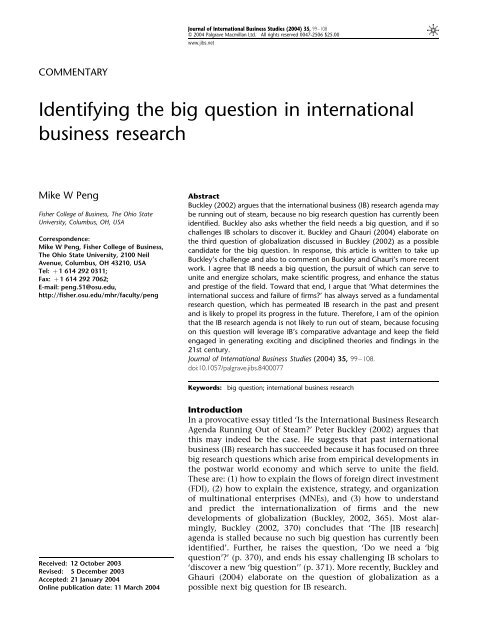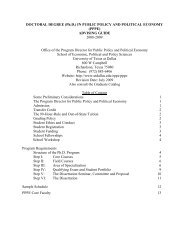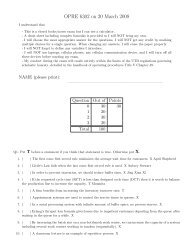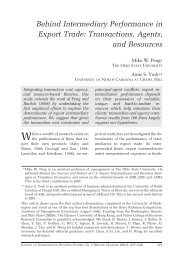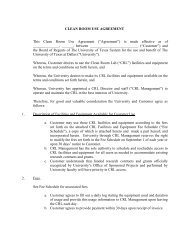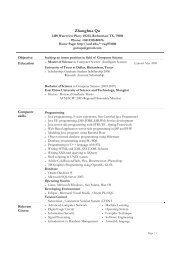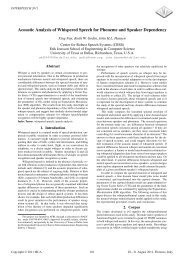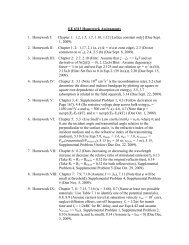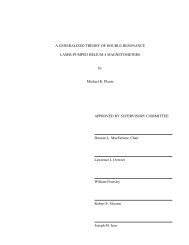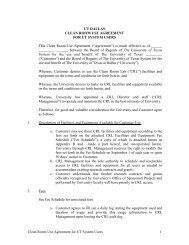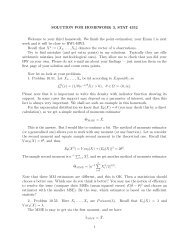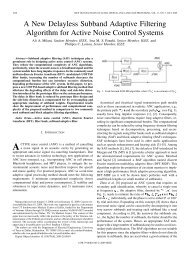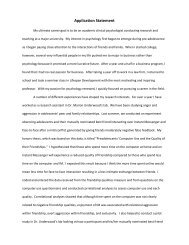Identifying the big question in international business research
Identifying the big question in international business research
Identifying the big question in international business research
You also want an ePaper? Increase the reach of your titles
YUMPU automatically turns print PDFs into web optimized ePapers that Google loves.
COMMENTARY<br />
<strong>Identify<strong>in</strong>g</strong> <strong>the</strong> <strong>big</strong> <strong>question</strong> <strong>in</strong> <strong>in</strong>ternational<br />
bus<strong>in</strong>ess <strong>research</strong><br />
Mike W Peng<br />
Fisher College of Bus<strong>in</strong>ess, The Ohio State<br />
University, Columbus, OH, USA<br />
Correspondence:<br />
Mike W Peng, Fisher College of Bus<strong>in</strong>ess,<br />
The Ohio State University, 2100 Neil<br />
Avenue, Columbus, OH 43210, USA<br />
Tel: þ 1 614 292 0311;<br />
Fax: þ 1 614 292 7062;<br />
E-mail: peng.51@osu.edu,<br />
http://fisher.osu.edu/mhr/faculty/peng<br />
Received: 12 October 2003<br />
Revised: 5 December 2003<br />
Accepted: 21 January 2004<br />
Onl<strong>in</strong>e publication date: 11 March 2004<br />
Journal of International Bus<strong>in</strong>ess Studies (2004) 35, 99–108<br />
& 2004 Palgrave Macmillan Ltd. All rights reserved 0047-2506 $25.00<br />
www.jibs.net<br />
Abstract<br />
Buckley (2002) argues that <strong>the</strong> <strong>in</strong>ternational bus<strong>in</strong>ess (IB) <strong>research</strong> agenda may<br />
be runn<strong>in</strong>g out of steam, because no <strong>big</strong> <strong>research</strong> <strong>question</strong> has currently been<br />
identified. Buckley also asks whe<strong>the</strong>r <strong>the</strong> field needs a <strong>big</strong> <strong>question</strong>, and if so<br />
challenges IB scholars to discover it. Buckley and Ghauri (2004) elaborate on<br />
<strong>the</strong> third <strong>question</strong> of globalization discussed <strong>in</strong> Buckley (2002) as a possible<br />
candidate for <strong>the</strong> <strong>big</strong> <strong>question</strong>. In response, this article is written to take up<br />
Buckley’s challenge and also to comment on Buckley and Ghauri’s more recent<br />
work. I agree that IB needs a <strong>big</strong> <strong>question</strong>, <strong>the</strong> pursuit of which can serve to<br />
unite and energize scholars, make scientific progress, and enhance <strong>the</strong> status<br />
and prestige of <strong>the</strong> field. Toward that end, I argue that ‘What determ<strong>in</strong>es <strong>the</strong><br />
<strong>in</strong>ternational success and failure of firms?’ has always served as a fundamental<br />
<strong>research</strong> <strong>question</strong>, which has permeated IB <strong>research</strong> <strong>in</strong> <strong>the</strong> past and present<br />
and is likely to propel its progress <strong>in</strong> <strong>the</strong> future. Therefore, I am of <strong>the</strong> op<strong>in</strong>ion<br />
that <strong>the</strong> IB <strong>research</strong> agenda is not likely to run out of steam, because focus<strong>in</strong>g<br />
on this <strong>question</strong> will leverage IB’s comparative advantage and keep <strong>the</strong> field<br />
engaged <strong>in</strong> generat<strong>in</strong>g excit<strong>in</strong>g and discipl<strong>in</strong>ed <strong>the</strong>ories and f<strong>in</strong>d<strong>in</strong>gs <strong>in</strong> <strong>the</strong><br />
21st century.<br />
Journal of International Bus<strong>in</strong>ess Studies (2004) 35, 99–108.<br />
doi:10.1057/palgrave.jibs.8400077<br />
Keywords: <strong>big</strong> <strong>question</strong>; <strong>in</strong>ternational bus<strong>in</strong>ess <strong>research</strong><br />
Introduction<br />
In a provocative essay titled ‘Is <strong>the</strong> International Bus<strong>in</strong>ess Research<br />
Agenda Runn<strong>in</strong>g Out of Steam?’ Peter Buckley (2002) argues that<br />
this may <strong>in</strong>deed be <strong>the</strong> case. He suggests that past <strong>in</strong>ternational<br />
bus<strong>in</strong>ess (IB) <strong>research</strong> has succeeded because it has focused on three<br />
<strong>big</strong> <strong>research</strong> <strong>question</strong>s which arise from empirical developments <strong>in</strong><br />
<strong>the</strong> postwar world economy and which serve to unite <strong>the</strong> field.<br />
These are: (1) how to expla<strong>in</strong> <strong>the</strong> flows of foreign direct <strong>in</strong>vestment<br />
(FDI), (2) how to expla<strong>in</strong> <strong>the</strong> existence, strategy, and organization<br />
of mult<strong>in</strong>ational enterprises (MNEs), and (3) how to understand<br />
and predict <strong>the</strong> <strong>in</strong>ternationalization of firms and <strong>the</strong> new<br />
developments of globalization (Buckley, 2002, 365). Most alarm<strong>in</strong>gly,<br />
Buckley (2002, 370) concludes that ‘The [IB <strong>research</strong>]<br />
agenda is stalled because no such <strong>big</strong> <strong>question</strong> has currently been<br />
identified’. Fur<strong>the</strong>r, he raises <strong>the</strong> <strong>question</strong>, ‘Do we need a ‘<strong>big</strong><br />
<strong>question</strong>’?’ (p. 370), and ends his essay challeng<strong>in</strong>g IB scholars to<br />
‘discover a new ‘<strong>big</strong> <strong>question</strong>’’ (p. 371). More recently, Buckley and<br />
Ghauri (2004) elaborate on <strong>the</strong> <strong>question</strong> of globalization as a<br />
possible next <strong>big</strong> <strong>question</strong> for IB <strong>research</strong>.
100<br />
Big <strong>question</strong> <strong>in</strong> <strong>in</strong>ternational bus<strong>in</strong>ess <strong>research</strong> Mike W Peng<br />
In response, this article is written primarily to<br />
take up Buckley’s (2002) challenge and also to<br />
comment on Buckley and Ghauri’s (2004) more<br />
recent work. While agree<strong>in</strong>g with Buckley’s (2002)<br />
review of <strong>the</strong> postwar IB <strong>research</strong> agenda, I beg to<br />
differ from his conclusion. I first suggest that IB<br />
needs a <strong>big</strong> <strong>question</strong>. Second, I argue that ‘What<br />
determ<strong>in</strong>es <strong>the</strong> <strong>in</strong>ternational success or failure of<br />
firms?’ has always been <strong>the</strong> lead<strong>in</strong>g <strong>question</strong><br />
guid<strong>in</strong>g IB <strong>research</strong>, and will cont<strong>in</strong>ue to rema<strong>in</strong><br />
so <strong>in</strong> <strong>the</strong> 21st century. This differs from <strong>the</strong><br />
globalization <strong>question</strong> Buckley and Ghauri (2004)<br />
suggest. F<strong>in</strong>ally, this article critiques Buckley’s<br />
(2002) view which is labeled as ‘scholarly mercantilism’<br />
and makes a set of recommendations. Overall,<br />
<strong>in</strong> contrast to <strong>the</strong> bleak outlook of <strong>the</strong> field that<br />
Buckley (2002) has pa<strong>in</strong>ted, I believe that <strong>the</strong> <strong>big</strong><br />
<strong>question</strong> on <strong>the</strong> determ<strong>in</strong>ants of <strong>in</strong>ternational firm<br />
performance is likely to leverage IB’s comparative<br />
advantage and propel its <strong>research</strong> agenda to new<br />
heights <strong>in</strong> <strong>the</strong> years to come.<br />
Buckley’s three ‘candidate’ <strong>big</strong> <strong>question</strong>s<br />
While Buckley masterfully and succ<strong>in</strong>ctly summarizes<br />
five decades of postwar IB <strong>research</strong> organized<br />
around <strong>the</strong> three <strong>big</strong> <strong>question</strong>s identified<br />
above, he has identified three possible contenders<br />
for <strong>the</strong> next <strong>big</strong> <strong>question</strong> (2002, 371):<br />
1. ‘Can we expla<strong>in</strong> <strong>the</strong> sequence of entry of nations<br />
as major players <strong>in</strong> <strong>the</strong> world economy? (Great<br />
Brita<strong>in</strong>, USA, Germany, Japan, S<strong>in</strong>gapore, Korea,<br />
Ch<strong>in</strong>a)’<br />
2. ‘Why are different forms of company organization<br />
characteristic of <strong>in</strong>dividual and cultural<br />
backgrounds? Or is this an artifact?’<br />
3. ‘In what empirical measures can we identify<br />
trends to (and away from) globalization?’<br />
However, Buckley (2002) is unable to suggest<br />
which one is ‘it’, thus lead<strong>in</strong>g to his statement that<br />
no <strong>big</strong> <strong>question</strong> has currently been identified.<br />
Extend<strong>in</strong>g earlier work, Buckley and Ghauri<br />
(2004) argue that some variant of <strong>the</strong> third <strong>question</strong><br />
may contend for <strong>the</strong> next <strong>big</strong> <strong>question</strong> status.<br />
While implicit <strong>in</strong> Buckley (2002), he seems to<br />
believe that a <strong>big</strong> <strong>question</strong> needs to be broad<br />
enough to appeal to most (if not all) IB <strong>research</strong>ers<br />
and yet narrow enough to carve out a dist<strong>in</strong>ctive<br />
segment <strong>in</strong> <strong>the</strong> <strong>in</strong>tellectual marketplace for IB (p.<br />
370). I agree, and based on <strong>the</strong>se criteria, let us go<br />
over <strong>the</strong>se ‘candidate’ <strong>question</strong>s.<br />
Take a look at <strong>the</strong> first ‘candidate’ <strong>question</strong>,<br />
whose unit of analysis is nation. Given that ‘IB’ is<br />
Journal of International Bus<strong>in</strong>ess Studies<br />
commonly def<strong>in</strong>ed by lead<strong>in</strong>g textbooks as ‘any<br />
firm that engages <strong>in</strong> <strong>in</strong>ternational trade or <strong>in</strong>vestment’<br />
(Hill, 2003, 29; see also, Griff<strong>in</strong> and Pustay,<br />
2003; Shenkar and Luo, 2004), this <strong>question</strong><br />
obviously is at a level higher than <strong>the</strong> firm-level<br />
analysis typical of IB <strong>research</strong>. Although IB <strong>research</strong><br />
may <strong>in</strong>volve multiple levels of analysis ‘from <strong>the</strong><br />
sub<strong>in</strong>dividual to <strong>the</strong> suprasocietal’ (Toyne and<br />
Nigh, 1998, 872), firm-level analysis rema<strong>in</strong>s at<br />
<strong>the</strong> heart of IB <strong>in</strong>quiry. While IB <strong>research</strong>ers are<br />
<strong>in</strong>terested <strong>in</strong> <strong>the</strong> competitive advantage of nations,<br />
our <strong>in</strong>terest ma<strong>in</strong>ly builds on <strong>the</strong> more foundational<br />
understand<strong>in</strong>g of how firms and <strong>in</strong>dustries<br />
with<strong>in</strong> different countries compete (Porter, 1990).<br />
In o<strong>the</strong>r words, given <strong>the</strong> higher level of analysis<br />
(nation), this <strong>question</strong>, while fasc<strong>in</strong>at<strong>in</strong>g, is not at<br />
<strong>the</strong> core of IB <strong>research</strong>. On <strong>the</strong> o<strong>the</strong>r hand, this<br />
<strong>question</strong> is at <strong>the</strong> core of <strong>the</strong> <strong>research</strong> agenda for<br />
some historians (Diamond, 1997; Kennedy, 1987),<br />
political scientists (Wallerste<strong>in</strong>, 1974–89), and<br />
<strong>in</strong>stitutional economists (North, 1990). Given that<br />
<strong>the</strong> work of some of <strong>the</strong>se social scientists now<br />
traces <strong>the</strong> orig<strong>in</strong> of competitive advantage to<br />
13,000 years ago (!) s<strong>in</strong>ce <strong>the</strong> beg<strong>in</strong>n<strong>in</strong>g of <strong>the</strong><br />
Agricultural Age (Diamond, 1997), it is difficult to<br />
imag<strong>in</strong>e how <strong>the</strong> <strong>in</strong>sights of IB <strong>research</strong>, even after<br />
we break some new ground on <strong>the</strong> sequence of <strong>the</strong><br />
rise of different nations start<strong>in</strong>g with Great Brita<strong>in</strong><br />
approximately 300 years ago as suggested by<br />
Buckley, can compete <strong>in</strong> <strong>the</strong> <strong>in</strong>tellectual marketplace<br />
on such long-run historical dynamics.<br />
Buckley (2002) himself rules out whe<strong>the</strong>r his<br />
second ‘candidate’ <strong>question</strong>, on cultural differences,<br />
can serve as a <strong>big</strong> <strong>question</strong>. He argues that<br />
‘issues [related to cultural differences] are perhaps<br />
best understood as exemplars of a particularly<br />
fruitful methodological approach – <strong>the</strong> comparative<br />
method, ra<strong>the</strong>r than as answer<strong>in</strong>g particular<br />
issues or confront<strong>in</strong>g radically separate agendas<br />
and stylized facts’ (p. 369). While cross-cultural<br />
<strong>research</strong>ers (such as contributors to Gannon and<br />
Newman, 2002) may disagree, I agree with Buckley<br />
that this particular <strong>question</strong>, <strong>in</strong> itself, is probably<br />
unable to become a <strong>big</strong> <strong>question</strong> unify<strong>in</strong>g <strong>the</strong> IB<br />
field. The reasons are two-fold. First, <strong>in</strong> terms of <strong>the</strong><br />
position<strong>in</strong>g of <strong>the</strong> field, pursu<strong>in</strong>g this <strong>question</strong> (i.e.,<br />
what are <strong>the</strong> differences?), as opposed to an<br />
explanatory and predictive focus characteriz<strong>in</strong>g<br />
much social science <strong>research</strong>, may lead IB studies<br />
to become excessively descriptive and less <strong>the</strong>oretical,<br />
thus provid<strong>in</strong>g ammunition to critics that IB<br />
<strong>research</strong> lacks rigor. Second, <strong>in</strong> terms of actual<br />
<strong>research</strong> practice, given <strong>the</strong> weak and sometimes
Big <strong>question</strong> <strong>in</strong> <strong>in</strong>ternational bus<strong>in</strong>ess <strong>research</strong> Mike W Peng<br />
confus<strong>in</strong>g conceptualization and measurement of<br />
culture (as critiqued by Shenkar, 2001), <strong>the</strong> relative<br />
decl<strong>in</strong>e of culture <strong>in</strong> <strong>the</strong> IB <strong>research</strong> agenda has<br />
already been documented (Sullivan, 1997). Overall,<br />
this <strong>question</strong> is less likely to be appeal<strong>in</strong>g to a<br />
majority of IB <strong>research</strong>ers.<br />
The third ‘candidate’ <strong>question</strong>, as phrased by<br />
Buckley (2002, 371), is simply an empirical <strong>question</strong><br />
and not a <strong>the</strong>oretical one. Even when engaged<br />
<strong>in</strong>, this <strong>question</strong>’s substantive doma<strong>in</strong>, globalization,<br />
is not a primary doma<strong>in</strong> of IB (at least<br />
historically), but ra<strong>the</strong>r is a doma<strong>in</strong> that is shared<br />
with fields such as <strong>in</strong>ternational political economy,<br />
economic geography, bus<strong>in</strong>ess and society (or social<br />
issues <strong>in</strong> management), and bus<strong>in</strong>ess ethics (Freeman,<br />
1997). Buckley and Ghauri (2004) now try to<br />
push this <strong>in</strong>terest<strong>in</strong>g and <strong>in</strong>creas<strong>in</strong>gly relevant<br />
<strong>question</strong> to <strong>the</strong> center stage of IB <strong>research</strong>, and<br />
some IB scholars (Doh and Teegen, 2003; Eden and<br />
Lenway, 2001) have started to explore <strong>the</strong>se<br />
important issues – efforts which I support.<br />
Although this <strong>question</strong> may become more important,<br />
it is less likely to become <strong>the</strong> <strong>big</strong> <strong>question</strong><br />
given IB <strong>research</strong>ers’ historically lack of <strong>in</strong>terest <strong>in</strong><br />
pursu<strong>in</strong>g it and <strong>the</strong> consequent lack of cumulative<br />
literature (Doh and Teegen, 2003; Eden and<br />
Lenway, 2001).<br />
Overall, it seems plausible that none of <strong>the</strong> three<br />
‘candidate’ <strong>question</strong>s that Buckley (2002) suggests,<br />
<strong>in</strong>clud<strong>in</strong>g <strong>the</strong> globalization <strong>question</strong> Buckley and<br />
Ghauri (2004) put forward more recently, can meet<br />
<strong>the</strong> criteria of be<strong>in</strong>g <strong>the</strong> <strong>big</strong> <strong>question</strong> for IB.<br />
But, this does not mean that IB has no clearcut<br />
<strong>big</strong> <strong>question</strong>. However, even before we enterta<strong>in</strong> a<br />
different <strong>big</strong> <strong>question</strong>, we need to address <strong>the</strong><br />
necessity of hav<strong>in</strong>g a <strong>big</strong> <strong>question</strong> as raised by<br />
Buckley (2002).<br />
Does IB need a <strong>big</strong> <strong>question</strong>?<br />
Before we proceed to discuss <strong>the</strong> <strong>big</strong> <strong>question</strong> for IB,<br />
it seems imperative that <strong>the</strong> conceptual doma<strong>in</strong> of<br />
IB be specified. This specification is nontrivial, and<br />
has engendered some significant debate (Boddewyn,<br />
1997; Toyne, 1997). S<strong>in</strong>ce spill<strong>in</strong>g fur<strong>the</strong>r <strong>in</strong>k<br />
on this debate is beyond <strong>the</strong> scope of <strong>the</strong> present<br />
article, I start with a most basic (and hopefully least<br />
controversial) proposition that IB has two essential<br />
components: ‘<strong>in</strong>ternational’ and ‘bus<strong>in</strong>ess’. That is,<br />
IB is primarily (but not only) concerned with<br />
bus<strong>in</strong>ess activities that cross national boundaries<br />
(‘<strong>in</strong>ternational’) and that occur at <strong>the</strong> firm level<br />
(‘bus<strong>in</strong>ess’) (Hill, 2003, 29). In o<strong>the</strong>r words, I agree<br />
with Wilk<strong>in</strong>s (1997, 32) that ‘what <strong>research</strong> on IB<br />
101<br />
must consider first and foremost (and what is our<br />
unique contribution) is <strong>the</strong> study of enterprise: <strong>the</strong><br />
<strong>in</strong>ternational—mult<strong>in</strong>ational–transnational–global<br />
bus<strong>in</strong>ess–enterprise–firm–company–corporation’.<br />
While Buckley (2002, 370) asks: Does IB need a<br />
<strong>big</strong> <strong>question</strong>?, he has already <strong>in</strong>directly answered it<br />
by not<strong>in</strong>g that IB has experienced some vigorous<br />
growth by pursu<strong>in</strong>g three earlier <strong>big</strong> <strong>question</strong>s. In<br />
fact, his dissatisfaction with <strong>the</strong> current IB <strong>research</strong><br />
is associated with <strong>the</strong> absence of any new <strong>big</strong><br />
<strong>question</strong> that he can identify. I agree that IB needs a<br />
<strong>big</strong> <strong>question</strong>. To <strong>the</strong> extent that IB aspires to<br />
become a scientific <strong>in</strong>quiry (Toyne, 1997, 64), it is<br />
important for <strong>the</strong> field to reach some consensus on<br />
<strong>the</strong> importance of a <strong>big</strong> <strong>question</strong> (or a few of <strong>the</strong>m),<br />
<strong>the</strong> pursuit of which serves to unite (most) IB<br />
scholars, make scientific progress, and enhance <strong>the</strong><br />
status and prestige of <strong>the</strong> field. O<strong>the</strong>rwise, a field<br />
unable or unwill<strong>in</strong>g to reach such consensus is<br />
likely to experience tremendous or even excessive<br />
diversity. Wilk<strong>in</strong>s (1997, 41), for example, argues<br />
that <strong>the</strong> danger for lett<strong>in</strong>g IB to rema<strong>in</strong> ‘an<br />
<strong>in</strong>terdiscipl<strong>in</strong>ary collage of different approaches’<br />
without identify<strong>in</strong>g a core <strong>the</strong>ory and a set of core<br />
concepts, engaged by a set of core <strong>question</strong>s, is that<br />
IB may become ‘no field at all’. Stopford (1998, 636)<br />
suggests that ‘if IB needs a unify<strong>in</strong>g <strong>the</strong>ory, <strong>the</strong>n it<br />
needs to become narrower <strong>in</strong> its scope’. 1 A field<br />
characterized by a wide scope that is difficult to<br />
reach consensus is likely to make little scientific<br />
progress and permanently rema<strong>in</strong> <strong>in</strong> <strong>the</strong> straightjacket<br />
of a preparadigm stage, 2 which does not<br />
confer status, prestige, and resources <strong>in</strong> <strong>the</strong> community<br />
of social sciences and bus<strong>in</strong>ess discipl<strong>in</strong>es<br />
(Pfeffer, 1993).<br />
While IB’s neighbor<strong>in</strong>g discipl<strong>in</strong>es, such as management,<br />
strategy, and market<strong>in</strong>g, have often been<br />
regarded as <strong>in</strong> a preparadigm stage (McK<strong>in</strong>ley et al.,<br />
1999), <strong>the</strong>y have never<strong>the</strong>less made progress <strong>in</strong><br />
identify<strong>in</strong>g some of <strong>the</strong>ir most fundamental<br />
<strong>research</strong> <strong>question</strong>s, to which (most) <strong>research</strong> energy<br />
of <strong>the</strong> field can be channeled (e.g., Rumelt et al.,<br />
1994). IB, be<strong>in</strong>g more eclectic, has historically been<br />
characterized by a significant emphasis on representativeness,<br />
<strong>in</strong>clusiveness, and <strong>the</strong>oretical and<br />
methodological diversity. ‘Although <strong>the</strong>se values<br />
are attractive ideals, <strong>the</strong>re are consequences for <strong>the</strong><br />
field’s ability to make scientific progress’ (Pfeffer,<br />
1993, 599). The primary consequences for IB are<br />
likely to be <strong>the</strong> field’s cont<strong>in</strong>ued classification – by<br />
both IB scholars and o<strong>the</strong>rs – as a preparadigm field<br />
with little hope of becom<strong>in</strong>g a more respected<br />
discipl<strong>in</strong>e characterized by a widely accepted<br />
Journal of International Bus<strong>in</strong>ess Studies
102<br />
Big <strong>question</strong> <strong>in</strong> <strong>in</strong>ternational bus<strong>in</strong>ess <strong>research</strong> Mike W Peng<br />
paradigm and a set of core <strong>question</strong>s around which<br />
(most of) <strong>the</strong> field’s <strong>research</strong> activities are organized.<br />
In general, areas of <strong>in</strong>quiry do not become<br />
dist<strong>in</strong>ct scientific discipl<strong>in</strong>es until <strong>the</strong>y adopt a<br />
paradigm (Kuhn, 1970), and ‘<strong>the</strong>re is no reason to<br />
th<strong>in</strong>k that IB is an exception to this rule’ (Peng,<br />
2001, 822). However, before IB (or any field) can<br />
move toward a common paradigm, identify<strong>in</strong>g a<br />
<strong>big</strong> fundamental <strong>question</strong> (or a few of <strong>the</strong>m) is a<br />
prerequisite, because ‘what def<strong>in</strong>es a field of <strong>in</strong>quiry<br />
such as IB is <strong>the</strong> type of <strong>question</strong>s asked’ (Hennart,<br />
1997, 645).<br />
There is no doubt that Buckley (2002) has made a<br />
significant contribution by articulat<strong>in</strong>g <strong>the</strong> existence<br />
and contributions of three <strong>big</strong> <strong>question</strong>s<br />
which have propelled IB’s development. However,<br />
<strong>in</strong> all due respect, I fundamentally disagree with his<br />
conclusion that IB is runn<strong>in</strong>g out of steam for lack<br />
of a new <strong>big</strong> <strong>question</strong>. That Buckley, despite his<br />
prom<strong>in</strong>ent status <strong>in</strong> and significant contributions<br />
to <strong>the</strong> field, is unable to identify a new <strong>big</strong> <strong>question</strong><br />
for <strong>the</strong> current IB <strong>research</strong> agenda does not mean<br />
that such a <strong>big</strong> <strong>question</strong> does not exist. In contrast,<br />
<strong>in</strong> <strong>the</strong> rema<strong>in</strong>der of this article, I argue (1) that IB<br />
has always had a <strong>big</strong> <strong>question</strong>, (2) that Buckley’s<br />
(2002) three previous <strong>big</strong> <strong>question</strong>s can be conceptualized<br />
as different aspects (branches) of this<br />
‘<strong>big</strong>ger’ <strong>question</strong>, and (3) that this <strong>question</strong> will<br />
cont<strong>in</strong>ue to propel <strong>the</strong> field <strong>in</strong> <strong>the</strong> 21st century.<br />
Cont<strong>in</strong>uity, novelty, and scope<br />
Fundamental <strong>question</strong>s ‘serve to highlight <strong>the</strong><br />
issues and presumptions that differentiate a field<br />
of <strong>in</strong>quiry’ (Rumelt et al., 1994, 40). Given IB’s tw<strong>in</strong><br />
focus on ‘<strong>in</strong>ternational’ and ‘bus<strong>in</strong>ess’ noted above,<br />
I argue that ‘What determ<strong>in</strong>es <strong>the</strong> <strong>in</strong>ternational<br />
success and failure of firms?’ has always been <strong>the</strong><br />
core <strong>question</strong> of IB that has served to unite most<br />
(but perhaps not all) IB <strong>research</strong>ers and to del<strong>in</strong>eate<br />
IB’s boundaries relative to o<strong>the</strong>r fields. Given <strong>the</strong><br />
nontrivial costs associated with <strong>the</strong> ‘liability of<br />
foreignness’ when do<strong>in</strong>g bus<strong>in</strong>ess abroad, IB<br />
<strong>research</strong>ers have for decades sought to understand<br />
<strong>the</strong> source of competitive advantages possessed and<br />
developed by non-native firms <strong>in</strong> foreign markets<br />
(Hymer, 1976, 1960; Peng, 2001; Wilk<strong>in</strong>s, 2001;<br />
Zaheer, 1995). McK<strong>in</strong>ley et al. (1999) argue that<br />
whe<strong>the</strong>r a particular school of thought, as exemplified<br />
by <strong>the</strong> pursuit of a core <strong>question</strong>, ga<strong>in</strong>s<br />
widespread acceptance depends on its (1) cont<strong>in</strong>uity,<br />
(2) novelty, and (3) scope. I argue that <strong>the</strong><br />
<strong>question</strong> of ‘What determ<strong>in</strong>es <strong>the</strong> <strong>in</strong>ternational<br />
success and failure?’ entails <strong>the</strong>se three attributes.<br />
Journal of International Bus<strong>in</strong>ess Studies<br />
First, this <strong>question</strong> exemplifies a great deal of<br />
cont<strong>in</strong>uity. Although not explicitly spelled out as<br />
such, this <strong>question</strong> underlies <strong>the</strong> three historical <strong>big</strong><br />
<strong>question</strong>s Buckley (2002) has identified. The determ<strong>in</strong>ants<br />
of <strong>the</strong> flows of FDI (<strong>the</strong> first <strong>question</strong>) boil<br />
down to how firms engag<strong>in</strong>g <strong>in</strong> FDI are able to<br />
atta<strong>in</strong> better performance <strong>in</strong> <strong>in</strong>ternational markets<br />
relative to entries us<strong>in</strong>g non-FDI modes such as<br />
export<strong>in</strong>g and licens<strong>in</strong>g (Buckley and Casson, 2002,<br />
1976). The existence, strategy, and organization of<br />
MNEs (<strong>the</strong> second <strong>question</strong>) center on how <strong>the</strong>se<br />
firms overcome <strong>the</strong> ‘liability of foreignness’ and<br />
outcompete local rivals (Caves, 1996; Dunn<strong>in</strong>g,<br />
1993; Hymer, 1976, 1960; Zaheer, 1995). The<br />
<strong>in</strong>ternationalization of firms (<strong>the</strong> third <strong>question</strong>)<br />
similarly depends on whe<strong>the</strong>r firms can successfully<br />
develop and deploy resources and capabilities<br />
which contribute to <strong>the</strong>ir performance abroad<br />
(Johanson and Vahlne, 1977; Peng, 2001). In a<br />
nutshell, <strong>the</strong> pursuit of all <strong>the</strong>se three <strong>big</strong> <strong>question</strong>s<br />
can be viewed as organized around <strong>the</strong> <strong>big</strong>ger<br />
<strong>question</strong> of ‘What determ<strong>in</strong>es <strong>the</strong> <strong>in</strong>ternational<br />
success and failure of firms?’<br />
Second, this <strong>question</strong> is sufficiently novel so as to<br />
engage (most of) <strong>the</strong> IB field characterized by a wide<br />
diversity of discipl<strong>in</strong>ary backgrounds, <strong>research</strong><br />
<strong>in</strong>terests, and methodological tools. While some<br />
IB scholars may argue that <strong>the</strong>y are not particularly<br />
concerned with <strong>the</strong> performance per se and that<br />
<strong>the</strong>y may be <strong>in</strong>terested <strong>in</strong> certa<strong>in</strong> IB phenomena<br />
(e.g., <strong>the</strong> existence of <strong>in</strong>stitutions and practices<br />
such as MNEs), ultimately, <strong>the</strong> successful, long-term<br />
existence of certa<strong>in</strong> phenomena carries strong<br />
performance implications <strong>in</strong> <strong>the</strong> sense that <strong>the</strong>se<br />
<strong>in</strong>stitutions and practices (e.g., MNEs) outcompete<br />
o<strong>the</strong>rs (e.g., non-MNE firms trad<strong>in</strong>g at <strong>the</strong> arm’s<br />
length across <strong>in</strong>ternational borders). 3 Therefore,<br />
Hennart (2001, 144) argues that ‘A <strong>the</strong>ory of <strong>the</strong><br />
MNE must also be a <strong>the</strong>ory of why <strong>the</strong> firm can be<br />
efficient’. In o<strong>the</strong>r words, to paraphrase <strong>the</strong> Mahoney<br />
<strong>the</strong>orem (2001, 656), if MNEs were to have a<br />
voice, <strong>the</strong>y might have said: ‘We outperform o<strong>the</strong>r<br />
organizational forms <strong>in</strong> IB, <strong>the</strong>refore we exist’. 4<br />
F<strong>in</strong>ally, <strong>the</strong> <strong>question</strong> on <strong>the</strong> determ<strong>in</strong>ants of<br />
<strong>in</strong>ternational performance excels <strong>in</strong> its scope. A<br />
broad scope helps <strong>in</strong>crease <strong>the</strong> potential number<br />
and variety of empirical tests, lead<strong>in</strong>g to a higher<br />
likelihood that a coherent stream of empirical<br />
<strong>research</strong> can be established (McK<strong>in</strong>ley et al.,<br />
1999). The many possible factors which may<br />
<strong>in</strong>fluence firms’ <strong>in</strong>ternational performance thus<br />
allow for numerous ways of <strong>the</strong>oriz<strong>in</strong>g and test<strong>in</strong>g,<br />
result<strong>in</strong>g <strong>in</strong> an expand<strong>in</strong>g and cumulative body of
Big <strong>question</strong> <strong>in</strong> <strong>in</strong>ternational bus<strong>in</strong>ess <strong>research</strong> Mike W Peng<br />
knowledge (e.g., Trabold, 2002). Yet, despite decades<br />
of <strong>research</strong>, we are still far from achiev<strong>in</strong>g a<br />
complete and def<strong>in</strong>itive answer to this vast, complex,<br />
and <strong>in</strong>trigu<strong>in</strong>g <strong>question</strong>. The rapidly mov<strong>in</strong>g<br />
events of <strong>the</strong> global environment, such as <strong>the</strong> rise<br />
of emerg<strong>in</strong>g economies as <strong>the</strong> new IB battleground<br />
(Hoskisson et al., 2000; Peng, 2003) and <strong>the</strong> impact<br />
of antiglobalization activities on IB (Buckley and<br />
Ghauri, 2004; Doh and Teegen, 2003; Eden and<br />
Lenway, 2001), necessitate <strong>in</strong>novative <strong>the</strong>oretical<br />
perspectives and empirical methodologies to provide<br />
new answers to this <strong>question</strong> and modify old<br />
answers (Dunn<strong>in</strong>g, 2001). The broad scope of this<br />
<strong>question</strong> ensures that its value is undim<strong>in</strong>ished by<br />
<strong>the</strong> fact that it has not been completely and<br />
satisfactorily answered.<br />
Overall, <strong>in</strong> <strong>the</strong> same spirit as Buckley and Casson<br />
(2001, 91) suggest that ‘Invest<strong>in</strong>g <strong>in</strong> new <strong>the</strong>ory is<br />
extremely wasteful if exist<strong>in</strong>g <strong>the</strong>ory is perfectly<br />
adequate’, I argue that search<strong>in</strong>g for a new <strong>big</strong><br />
<strong>question</strong> may be wasteful if an exist<strong>in</strong>g <strong>big</strong> <strong>question</strong><br />
on <strong>the</strong> determ<strong>in</strong>ants of <strong>in</strong>ternational firm performance<br />
has enough cont<strong>in</strong>uity, novelty, and scope<br />
to do <strong>the</strong> job. This view does not imply that<br />
economic geography-related <strong>in</strong>sights as suggested<br />
by Buckley and Ghauri (2004) are not important.<br />
There is no doubt that IB fundamentally is about a<br />
spatial perspective on bus<strong>in</strong>ess, that is, why and<br />
how to do bus<strong>in</strong>ess outside one’s home country. It<br />
is important to note, for example, that location (L)<br />
is right <strong>in</strong> <strong>the</strong> middle of Dunn<strong>in</strong>g’s (1993) <strong>in</strong>fluential<br />
OLI paradigm. My po<strong>in</strong>t here is that <strong>the</strong> pursuit<br />
for location-specific advantages have always been a<br />
def<strong>in</strong><strong>in</strong>g feature of IB practice and <strong>research</strong>, which<br />
can be well captured by <strong>the</strong> <strong>question</strong> ‘What<br />
determ<strong>in</strong>es <strong>the</strong> <strong>in</strong>ternational success and failure of<br />
firms?’ This focus on firm performance is also<br />
evident <strong>in</strong> Buckley and Ghauri’s (2004) explication<br />
on how MNEs deploy various location strategies to<br />
ga<strong>in</strong> competitive advantages.<br />
IB’s boundaries, imports, and exports<br />
Ano<strong>the</strong>r aspect of <strong>the</strong> <strong>big</strong> <strong>question</strong> that Buckley<br />
(2002, 370) touches on is its ability to demarcate<br />
<strong>the</strong> boundaries separat<strong>in</strong>g IB from o<strong>the</strong>r discipl<strong>in</strong>es.<br />
While much <strong>in</strong>k has been spilled on whe<strong>the</strong>r IB<br />
should have dist<strong>in</strong>ct boundaries relative to o<strong>the</strong>r<br />
discipl<strong>in</strong>es (Boddewyn, 1997; Toyne, 1997), this<br />
article focuses on whe<strong>the</strong>r <strong>the</strong> <strong>big</strong> <strong>question</strong> identified<br />
above helps def<strong>in</strong>e <strong>the</strong> IB field. I believe that<br />
<strong>the</strong> <strong>question</strong> on <strong>in</strong>ternational firm performance has<br />
<strong>the</strong> potential to do that, because no o<strong>the</strong>r <strong>question</strong><br />
103<br />
better captures both <strong>the</strong> ‘<strong>in</strong>ternational’ and ‘bus<strong>in</strong>ess’<br />
aspects of IB than this <strong>question</strong>.<br />
On <strong>the</strong> o<strong>the</strong>r hand, I believe that given today’s<br />
global economy and <strong>in</strong>creas<strong>in</strong>gly <strong>in</strong>terdiscipl<strong>in</strong>ary<br />
scholarship, to argue that this <strong>question</strong> (or <strong>in</strong> fact,<br />
any o<strong>the</strong>r <strong>question</strong>) leads to a doma<strong>in</strong> so unique to<br />
IB that it is not relevant to o<strong>the</strong>r discipl<strong>in</strong>es is<br />
probably <strong>in</strong>defensible, if not foolhardy. IB’s permeable<br />
boundaries have historically been a great<br />
strength of <strong>the</strong> field (Bartlett and Ghoshal, 1991;<br />
Dunn<strong>in</strong>g, 2001; Peng, 2001; Rugman and Brewer,<br />
2001; Toyne and Nigh, 1997), and it is not realistic<br />
to believe that IB can now erect a sort of Ch<strong>in</strong>ese<br />
Wall – by <strong>in</strong>vok<strong>in</strong>g one or a few <strong>big</strong> <strong>question</strong>s – that<br />
separates itself from o<strong>the</strong>r discipl<strong>in</strong>es, now that<br />
many o<strong>the</strong>r discipl<strong>in</strong>es (e.g., strategy, market<strong>in</strong>g)<br />
have been significantly ‘<strong>in</strong>ternationalized’ (often at<br />
<strong>the</strong> urg<strong>in</strong>g of IB scholars!). In our particular case,<br />
<strong>the</strong> performance <strong>question</strong> of course confronts all<br />
firms, domestic and <strong>in</strong>ternational. Follow<strong>in</strong>g<br />
Hennart (1997), I believe that although <strong>the</strong><br />
issues which IB needs to focus on may arise<br />
<strong>in</strong> both domestic and <strong>in</strong>ternational contexts,<br />
<strong>the</strong>se issues need to be ‘more salient <strong>in</strong>ternationally<br />
than domestically’ (Hennart, 1997, 645). As a<br />
result, while o<strong>the</strong>r discipl<strong>in</strong>es may have some<br />
<strong>in</strong>terest <strong>in</strong> <strong>the</strong> <strong>question</strong> ‘What determ<strong>in</strong>es <strong>the</strong><br />
<strong>in</strong>ternational success and failure of firms?’ I am<br />
confident that no o<strong>the</strong>r discipl<strong>in</strong>e is likely to be as<br />
passionately <strong>in</strong>terested as IB <strong>in</strong> <strong>the</strong> pursuit of this<br />
<strong>question</strong>.<br />
Moreover, I agree with Hennart (1997, 645) <strong>in</strong><br />
that good IB <strong>research</strong> does not deal exclusively with<br />
<strong>in</strong>ternational phenomena, and that IB contributions<br />
are likely to have general applicability beyond<br />
<strong>the</strong> IB field. In o<strong>the</strong>r words, <strong>the</strong>re may be no IBonly<br />
phenomenon. 5 IB, fundamentally, is a discipl<strong>in</strong>e<br />
about ‘bus<strong>in</strong>ess’ and not merely a discipl<strong>in</strong>e<br />
about ‘<strong>in</strong>ternational’. 6 It is <strong>in</strong>terest<strong>in</strong>g to note that<br />
Rumelt et al. (1994, 564) argue that ‘What determ<strong>in</strong>es<br />
<strong>the</strong> <strong>in</strong>ternational success and failure of<br />
firms?’ is one of <strong>the</strong> top four fundamental <strong>research</strong><br />
<strong>question</strong>s <strong>in</strong> strategy. This overlap between IB and<br />
strategy suggests that IB contributions will not only<br />
propel <strong>the</strong> IB <strong>research</strong> agenda but will also help<br />
strategy tackle one of its most fundamental <strong>question</strong>s<br />
(Bartlett and Ghoshal, 1991). Peng (2001,<br />
820) has argued that some recent IB <strong>research</strong>, such<br />
as work on global strategies, subsidiary capabilities,<br />
strategic alliances, and emerg<strong>in</strong>g economies, ‘is<br />
clearly at <strong>the</strong> lead<strong>in</strong>g edge of strategy <strong>research</strong>, thus<br />
help<strong>in</strong>g set <strong>the</strong> terms for <strong>the</strong> strategy <strong>research</strong><br />
agenda’. 7<br />
Journal of International Bus<strong>in</strong>ess Studies
104<br />
Big <strong>question</strong> <strong>in</strong> <strong>in</strong>ternational bus<strong>in</strong>ess <strong>research</strong> Mike W Peng<br />
Buckley (2002, 370) observes that ‘In its successful<br />
era, IB <strong>research</strong>ers not only imported concepts<br />
and paradigms, <strong>the</strong>y also exported <strong>the</strong>m to neighbor<strong>in</strong>g<br />
areas’, and goes on to suggest that ‘This does<br />
not seem to be occurr<strong>in</strong>g at <strong>the</strong> moment’. At <strong>the</strong><br />
moment, it probably is true that IB has experienced<br />
a ‘trade deficit’ <strong>in</strong> its scholarly exchanges with<br />
o<strong>the</strong>r discipl<strong>in</strong>es. In o<strong>the</strong>r words, <strong>the</strong> scale and<br />
scope of IB’s <strong>in</strong>tellectual ‘exports’ to neighbor<strong>in</strong>g<br />
discipl<strong>in</strong>es are less than IB’s <strong>in</strong>tellectual ‘imports’,<br />
and many IB scholars (<strong>in</strong>clud<strong>in</strong>g Buckley) naturally<br />
would like to see IB’s ‘export’ market share <strong>in</strong> <strong>the</strong><br />
<strong>in</strong>tellectual marketplace <strong>in</strong>crease. However, to<br />
argue that IB does not export at all fails to<br />
acknowledge IB’s emerg<strong>in</strong>g <strong>in</strong>fluence <strong>in</strong> <strong>the</strong> social<br />
science <strong>research</strong> enterprise (Markusen, 2001, 74).<br />
There is no doubt that IB has made numerous<br />
empirical contributions (Kogut, 2001). In fact,<br />
Buckley (2002, 370) posits that ‘One response [to<br />
<strong>the</strong> criticism on IB’s lack of ‘export’ market share <strong>in</strong><br />
<strong>the</strong> <strong>in</strong>tellectual marketplace] is to argue that IB is<br />
def<strong>in</strong>ed by its dist<strong>in</strong>ctive methods’. Aga<strong>in</strong>, I<br />
disagree with this argument, because it downgrades<br />
IB to an empirical branch of o<strong>the</strong>r discipl<strong>in</strong>es and<br />
suggests that IB can go on without develop<strong>in</strong>g its<br />
own <strong>the</strong>oretical basis. This is no less than accept<strong>in</strong>g<br />
<strong>the</strong> criticism of non-IB scholars (and, unfortunately,<br />
of some IB scholars) that ‘IB has no <strong>the</strong>ory’.<br />
In <strong>the</strong> long run, <strong>the</strong> very existence of a discipl<strong>in</strong>e<br />
without a <strong>the</strong>oretical basis, if pushed to <strong>the</strong> extreme<br />
(especially dur<strong>in</strong>g times of resource and budgetary<br />
hardship), may be endangered (Pfeffer, 1993). This<br />
probably is not <strong>the</strong> dest<strong>in</strong>y of <strong>the</strong> IB field that<br />
Buckley and o<strong>the</strong>r concerned IB scholars (e.g.,<br />
contributors to Rugman and Brewer, 2001; Toyne<br />
and Nigh, 1997) would like to see.<br />
While <strong>the</strong>re may be o<strong>the</strong>r examples of IB<br />
‘exports’, I use two recent examples – one macro<br />
and <strong>the</strong> o<strong>the</strong>r micro – of how IB <strong>research</strong> has been<br />
‘exported’ to a major source of IB ‘imports’,<br />
economics, to refute Buckley’s argument above. In<br />
<strong>the</strong> macro area, IB’s development of an <strong>in</strong>ternalization<br />
<strong>the</strong>ory of <strong>the</strong> MNE, pioneered by some of<br />
Buckley’s earlier work (Buckley and Casson, 2002,<br />
1976) and later articulated by Dunn<strong>in</strong>g (1993),<br />
Hennart (1982), Rugman (1981), and o<strong>the</strong>r IB<br />
scholars, directly contributes to traditional economic<br />
<strong>the</strong>ory, which previously had only regarded<br />
FDI as an export of capital as opposed to a control<br />
vehicle to reduce transaction costs (Markusen,<br />
2001). Fur<strong>the</strong>r, this IB <strong>the</strong>ory is not a mere<br />
application of Williamson’s (1975) transaction<br />
costs economics (TCE) framework (Kogut, 2001).<br />
Journal of International Bus<strong>in</strong>ess Studies<br />
Instead, <strong>the</strong> <strong>in</strong>ternalization <strong>the</strong>ory of <strong>the</strong> MNE<br />
‘antedates it [TCE] and has proceeded quite <strong>in</strong>dependently<br />
even though Williamson’s <strong>in</strong>fluence has<br />
subsequently been significant’ (Hennart, 1997, 647;<br />
see also, Hennart, 2001, 132; Kogut, 2001, 787).<br />
In <strong>the</strong> micro area, IB scholars have drawn upon a<br />
well-established cross-cultural literature on <strong>in</strong>dividualism<br />
and collectivism (Hofstede, 1980; Triandis,<br />
1995) to <strong>in</strong>form TCE <strong>research</strong> with a focus on its<br />
core assumption: opportunism (Chen et al., 2002).<br />
Although TCE scholars never assume that all<br />
<strong>in</strong>dividuals are opportunistic all <strong>the</strong> time, <strong>the</strong>y<br />
have never<strong>the</strong>less built a <strong>the</strong>oretical framework<br />
based on an underdeveloped assumption of opportunism,<br />
cit<strong>in</strong>g <strong>the</strong> <strong>in</strong>ability to differentiate opportunists,<br />
who may be a m<strong>in</strong>ority <strong>in</strong> any given<br />
population, from non-opportunists ex ante (Williamson,<br />
1975). Equipped with empirical evidence<br />
from IB <strong>research</strong> that <strong>in</strong>dividuals <strong>in</strong> different<br />
cultures exhibit different opportunistic propensities,<br />
Chen et al. (2002) suggest a cultural perspective<br />
on TCE. They specify that <strong>in</strong>dividualists may have a<br />
higher opportunistic propensity <strong>in</strong> <strong>in</strong>tra-group<br />
transactions and collectivists <strong>in</strong> <strong>in</strong>ter-group transactions.<br />
Chen et al. (2002) ma<strong>in</strong>ta<strong>in</strong> that <strong>in</strong>discrim<strong>in</strong>ately<br />
assum<strong>in</strong>g an equal level of opportunism may<br />
expla<strong>in</strong> critics’ dissatisfaction with TCE and, more<br />
importantly, may backfire when firms attempt to<br />
conta<strong>in</strong> opportunism based on this assumption <strong>in</strong><br />
operations around <strong>the</strong> world. Clearly positioned as<br />
an IB ‘export’, <strong>the</strong> aim of this work is to ‘help TCE<br />
to more effectively accommodate some criticisms<br />
and more realistically deal with problems of<br />
economic organization <strong>in</strong> today’s global economy’<br />
(Chen et al., 2002, 567).<br />
Overall, Buckley (2002) may have exhibited a<br />
tendency which can be labeled as ‘scholarly<br />
mercantilism’, characterized by his advocacy for<br />
hav<strong>in</strong>g possibly sealed and protected boundaries for<br />
IB set by whatever ‘<strong>big</strong> <strong>question</strong>s’ <strong>the</strong> field can<br />
establish, <strong>in</strong>terest <strong>in</strong> see<strong>in</strong>g more IB ‘exports’ than<br />
‘imports’, and frustration with IB’s ‘trade deficit’ <strong>in</strong><br />
scholarly exchanges. 8 Although this is a very<br />
natural and <strong>in</strong>tuitive tendency, I believe that<br />
Buckley (and o<strong>the</strong>r IB scholars who share his view)<br />
can do better, because every IB textbook has<br />
conv<strong>in</strong>c<strong>in</strong>gly <strong>in</strong>dicated that mercantilistic th<strong>in</strong>k<strong>in</strong>g,<br />
characterized by its zero-sum mentality <strong>in</strong><br />
favor of more exports and less imports, has become<br />
outdated (e.g., Griff<strong>in</strong> and Pustay, 2003; Hill, 2003;<br />
Shenkar and Luo, 2004). Accord<strong>in</strong>g to <strong>the</strong> <strong>the</strong>ory of<br />
mercantilism, <strong>the</strong> United States, which has <strong>the</strong><br />
world’s largest trade deficit, should have <strong>the</strong> world’s
Big <strong>question</strong> <strong>in</strong> <strong>in</strong>ternational bus<strong>in</strong>ess <strong>research</strong> Mike W Peng<br />
lowest standard of liv<strong>in</strong>g; but <strong>in</strong>stead, it has enjoyed<br />
one of <strong>the</strong> world’s highest. It is evident that <strong>the</strong><br />
<strong>the</strong>ory of mercantilism does not work <strong>in</strong> this case.<br />
Similarly, <strong>in</strong> today’s <strong>in</strong>creas<strong>in</strong>gly <strong>in</strong>tegrated global<br />
economy where national boundaries are significantly<br />
permeated, what counts for a nation’s<br />
trad<strong>in</strong>g position is not its absolute advantage <strong>in</strong><br />
push<strong>in</strong>g its exports around <strong>the</strong> world; <strong>in</strong>stead, it is<br />
its comparative advantage that determ<strong>in</strong>es how it<br />
can contribute to <strong>the</strong> global economy (Porter, 1990;<br />
Ricardo, 1967 (1817)). Consequently, <strong>the</strong>re is<br />
reason to believe that IB as a field can thrive by<br />
leverag<strong>in</strong>g its comparative advantage (Shenkar,<br />
2004).<br />
Recommendations<br />
It is <strong>the</strong> contention of this article that IB’s<br />
comparative advantage lies <strong>in</strong> <strong>the</strong> <strong>in</strong>terest and<br />
expertise <strong>in</strong> <strong>the</strong> pursuit of <strong>the</strong> <strong>question</strong>: ‘What<br />
determ<strong>in</strong>es <strong>the</strong> <strong>in</strong>ternational success and failure of<br />
firms?’ Therefore, I believe that if IB scholars truly<br />
believe and practice some of our own teach<strong>in</strong>g, it is<br />
plausible to recommend <strong>the</strong> follow<strong>in</strong>g:<br />
1. IB’s boundaries should rema<strong>in</strong> reasonably open<br />
for more vibrant and beneficial scholarly<br />
exchanges, just as national boundaries should<br />
rema<strong>in</strong> <strong>the</strong> same if nations aspire to be contribut<strong>in</strong>g<br />
members of <strong>the</strong> global economy.<br />
Intended to br<strong>in</strong>g out <strong>the</strong> best of IB and o<strong>the</strong>r<br />
discipl<strong>in</strong>es <strong>in</strong> a Ricardian sense for ‘enhanced<br />
global welfare’ of <strong>the</strong> <strong>research</strong> enterprise (Dunn<strong>in</strong>g,<br />
2001, 62), this ‘pro-free trade’ position is<br />
not necessarily driven by <strong>the</strong> default position<br />
that today it is practically impossible to ma<strong>in</strong>ta<strong>in</strong><br />
closed boundaries for <strong>the</strong> IB field (or for national<br />
boundaries). In o<strong>the</strong>r words, IB scholars need not<br />
compla<strong>in</strong> too much on non-IB scholars’s<br />
‘encroachment’ or ‘expropriation’ of IB <strong>research</strong>.<br />
As Boddewyn (1997, 642) paraphrases <strong>the</strong> Gospels:<br />
‘<strong>the</strong>re are many rooms <strong>in</strong> <strong>the</strong> IB mansion’.<br />
When non-IB scholars enter <strong>the</strong> vast IB mansion<br />
through different entrances, IB scholars should<br />
welcome <strong>the</strong>se new entrants and seek to ‘convert’<br />
some non-IB scholars to become members<br />
of <strong>the</strong> IB family (Toyne and Nigh, 1998, 869).<br />
2. As long as IB scholarship is generat<strong>in</strong>g some<br />
respectable ‘exports’ to o<strong>the</strong>r discipl<strong>in</strong>es, IB’s<br />
‘trade deficit’ is not a grave concern and we need<br />
not be too nervous about it. Instead, it motivates<br />
us to work harder and smarter (Kogut, 2001,<br />
811). Scholars who are worried that IB may<br />
experience a permanent ‘trade deficit’ perhaps<br />
105<br />
need to revisit Vernon’s (1966) <strong>in</strong>sights on <strong>the</strong><br />
chang<strong>in</strong>g trade pattern among nations dur<strong>in</strong>g<br />
different product life cycle stages and Porter’s<br />
(1990) account on how different forms of <strong>the</strong><br />
national ‘diamond’ can <strong>in</strong>teract to facilitate a<br />
global expansion of a nation’s <strong>in</strong>dustries (or, if<br />
we may, a discipl<strong>in</strong>e’s <strong>in</strong>tellectual products).<br />
While IB is currently <strong>in</strong> a preparadigm stage<br />
and experiences a ‘trade deficit’, it is not hopeless<br />
<strong>in</strong> possibly mov<strong>in</strong>g toward a more paradigmatically<br />
developed field and chang<strong>in</strong>g its ‘balance of<br />
trade’. 9 In short, IB scholars need to be <strong>in</strong> <strong>the</strong><br />
game, play hard, and aim high. Stated differently,<br />
‘IB <strong>research</strong>ers need not be afraid of <strong>the</strong><br />
potential competition of o<strong>the</strong>r discipl<strong>in</strong>es, nor<br />
should <strong>the</strong>y have any <strong>in</strong>feriority complex about<br />
<strong>the</strong> field’s <strong>the</strong>oretical achievements’ (Hennart,<br />
1997, 651) and ‘methodological accomplishments’<br />
(Kogut, 2001).<br />
3. Although perhaps IB may not have an absolute<br />
advantage <strong>in</strong> compet<strong>in</strong>g aga<strong>in</strong>st some of <strong>the</strong><br />
more established discipl<strong>in</strong>es, it never<strong>the</strong>less has a<br />
comparative advantage <strong>in</strong> carv<strong>in</strong>g out an <strong>in</strong>tellectual<br />
space <strong>in</strong> <strong>the</strong> community of social sciences<br />
and bus<strong>in</strong>ess discipl<strong>in</strong>es (Shenkar, 2004). 10<br />
Toward that end, I believe that pursu<strong>in</strong>g <strong>the</strong><br />
<strong>question</strong>, ‘What determ<strong>in</strong>es <strong>the</strong> <strong>in</strong>ternational<br />
success and failure of firms?’ best capitalizes on<br />
IB’s comparative advantage <strong>in</strong> cont<strong>in</strong>u<strong>in</strong>g with<br />
its past tradition and present trajectory, provid<strong>in</strong>g<br />
sufficient novelty as a unique (but not<br />
closed) field, and ma<strong>in</strong>ta<strong>in</strong><strong>in</strong>g a broad scope to<br />
facilitate a cumulative body of <strong>the</strong>oretical and<br />
empirical knowledge. Therefore, I agree with<br />
Hennart (1997, 651) that ‘IB will cont<strong>in</strong>ue to<br />
develop as a viable and dist<strong>in</strong>ct field of <strong>in</strong>quiry,<br />
and that <strong>the</strong> fears that it might get absorbed by<br />
more <strong>the</strong>oretical discipl<strong>in</strong>es (such as economics<br />
or organization <strong>the</strong>ory) are exaggerated’.<br />
Conclusions<br />
There is no doubt that Buckley (2002) has made a<br />
significant contribution by challeng<strong>in</strong>g <strong>the</strong> IB field<br />
to th<strong>in</strong>k hard about itself. Yet, <strong>in</strong> all due respect,<br />
this article begs to differ from his conclusion that<br />
<strong>the</strong> IB <strong>research</strong> agenda is runn<strong>in</strong>g out of steam.<br />
Given that Buckely himself recently has stated that<br />
‘<strong>the</strong> [IB] <strong>research</strong> agenda is still be<strong>in</strong>g actively<br />
developed’ (Buckley and Casson, 2002, x) and that<br />
his more recent work on globalization (Buckley<br />
and Ghauri, 2004) has sought to develop it, his<br />
Journal of International Bus<strong>in</strong>ess Studies
106<br />
conclusion <strong>in</strong> <strong>the</strong> 2002 essay is puzzl<strong>in</strong>g. In<br />
contrast, I argue that ‘What determ<strong>in</strong>es <strong>the</strong> <strong>in</strong>ternational<br />
success and failure of firms?’ has always<br />
served as a fundamental <strong>research</strong> <strong>question</strong> for IB.<br />
Although it is true that not every IB scholar directly<br />
answers this <strong>question</strong>, I believe that <strong>the</strong> various<br />
<strong>research</strong> <strong>question</strong>s IB <strong>research</strong> seeks to address all<br />
relate to it <strong>in</strong> one way or <strong>the</strong> o<strong>the</strong>r. Explicitly<br />
focus<strong>in</strong>g on this <strong>question</strong> may help <strong>the</strong> field better<br />
organize its <strong>research</strong> activities, reach some consensus<br />
(as a first step, on what <strong>the</strong> <strong>big</strong> <strong>question</strong> is as<br />
opposed to on what <strong>the</strong> answers are), and strive to<br />
become a more mature discipl<strong>in</strong>e organized around<br />
some paradigm(s). Theoretical and methodological<br />
diversity is still encouraged as long as <strong>the</strong>re is some<br />
agreement on fundamental <strong>question</strong>s, such as <strong>the</strong><br />
one suggested here, and ‘on a set of rules to w<strong>in</strong>now<br />
<strong>the</strong> measures, methods, and <strong>the</strong>ories on <strong>the</strong> basis of<br />
accumulated evidence’ (Pfeffer, 1993, 616). In o<strong>the</strong>r<br />
words, while creativity and imag<strong>in</strong>ation are commendable<br />
<strong>in</strong> <strong>the</strong> <strong>research</strong> enterprise, what IB needs<br />
is discipl<strong>in</strong>ed imag<strong>in</strong>ation (Stopford, 1998; Weick,<br />
1989). Overall, I am of <strong>the</strong> op<strong>in</strong>ion that <strong>the</strong> IB<br />
<strong>research</strong> agenda is not likely to run out of steam,<br />
because focus<strong>in</strong>g on <strong>the</strong> <strong>in</strong>ternational firm performance<br />
<strong>question</strong> will leverage IB’s comparative<br />
advantage and keep <strong>the</strong> field engaged <strong>in</strong> generat<strong>in</strong>g<br />
excit<strong>in</strong>g and discipl<strong>in</strong>ed <strong>the</strong>ories and f<strong>in</strong>d<strong>in</strong>gs <strong>in</strong><br />
<strong>the</strong> 21st century.<br />
In conclusion, I agree with Buckley (2002, 370)<br />
that ‘<strong>the</strong> way forward is, paradoxically, to<br />
look back’. It is exactly by look<strong>in</strong>g back have<br />
we discovered <strong>the</strong> long-run core <strong>question</strong> on<br />
‘What determ<strong>in</strong>es <strong>the</strong> <strong>in</strong>ternational success and<br />
failure of firms?’, <strong>the</strong> pursuit of which has permeated<br />
<strong>the</strong> IB <strong>research</strong> agenda <strong>in</strong> <strong>the</strong> past and present,<br />
and will likely cont<strong>in</strong>ue to propel it <strong>in</strong> <strong>the</strong> future.<br />
While not everyone will agree with <strong>the</strong> <strong>big</strong> <strong>question</strong><br />
identified here, if this article, like Buckley (2002)<br />
and Buckley and Ghauri (2004), can provoke more<br />
debate on what IB’s <strong>big</strong> <strong>question</strong>s are, <strong>the</strong>n my<br />
purposes for jo<strong>in</strong><strong>in</strong>g this debate will have been well<br />
served.<br />
Acknowledgements<br />
This <strong>research</strong> was supported <strong>in</strong> part by a National<br />
Science Foundation Faculty Career Grant (SES<br />
0238820) and <strong>the</strong> Center for International Bus<strong>in</strong>ess<br />
Education and Research at The Ohio State University.<br />
Discussions with Oded Shenkar, Mona Makhija, Steve<br />
Hills, Jane Lu, Joe Mahoney, Jean-Francois Hennart,<br />
and participants <strong>in</strong> <strong>the</strong> Ph.D. <strong>in</strong>dependent read<strong>in</strong>gs<br />
sem<strong>in</strong>ar are helpful for <strong>the</strong> development of <strong>the</strong>se ideas.<br />
Journal of International Bus<strong>in</strong>ess Studies<br />
Big <strong>question</strong> <strong>in</strong> <strong>in</strong>ternational bus<strong>in</strong>ess <strong>research</strong> Mike W Peng<br />
F<strong>in</strong>ally, I thank Arie Y. Lew<strong>in</strong> for editorial guidance and<br />
Yi Jiang and Yuanyuan Zhou for <strong>research</strong> assistance.<br />
Notes<br />
1 On <strong>the</strong> o<strong>the</strong>r hand, Sullivan (1998) argues that IB<br />
may suffer from a ‘narrow vision’. Never<strong>the</strong>less, it is<br />
widely agreed by many IB and non-IB scholars that <strong>the</strong><br />
scope of IB is wider than that of many o<strong>the</strong>r bus<strong>in</strong>ess<br />
discipl<strong>in</strong>es.<br />
2 See Kuhn (1970) for an <strong>in</strong>fluential discussion on <strong>the</strong><br />
difference between a paradigm stage and a preparadigm<br />
stage <strong>in</strong> <strong>the</strong> development of scientific discipl<strong>in</strong>es.<br />
IB does have several paradigms, <strong>in</strong>clud<strong>in</strong>g<br />
Dunn<strong>in</strong>g’s (1993) ‘eclectic’ paradigm and <strong>the</strong> three<br />
paradigms identified by Toyne and Nigh (1998),<br />
namely, extension, cross-border management, and<br />
evolv<strong>in</strong>g <strong>in</strong>teraction paradigms. What <strong>the</strong> field seems<br />
to lack is a unify<strong>in</strong>g paradigm.<br />
3 Wilk<strong>in</strong>s (2001, 23), for example, notes that ‘The<br />
bus<strong>in</strong>ess historian is <strong>in</strong>terested <strong>in</strong> what constitutes<br />
‘advantage’ over time <strong>in</strong> <strong>the</strong> spread of <strong>in</strong>ternational<br />
bus<strong>in</strong>ess y This br<strong>in</strong>gs bus<strong>in</strong>ess historians to <strong>the</strong><br />
<strong>question</strong> of performance’.<br />
4 There is a parallel debate <strong>in</strong> transaction cost<br />
economics (TCE) <strong>in</strong> that some scholars argue that<br />
<strong>the</strong> orig<strong>in</strong>al development of TCE does not focus on<br />
firm performance; ra<strong>the</strong>r, it focuses on governance<br />
choices (Williamson, 1975). However, governance<br />
choices have clear performance implications <strong>in</strong> that<br />
firms that choose <strong>the</strong> most appropriate governance<br />
structure will encounter <strong>the</strong> lowest transaction costs<br />
and, hence, atta<strong>in</strong> <strong>the</strong> highest performance (<strong>the</strong>oretically<br />
at least). Therefore, firm existence and firm<br />
performance cannot exist <strong>in</strong>dependently; <strong>in</strong>stead, <strong>the</strong>y<br />
are <strong>in</strong>tertw<strong>in</strong>ed (Mahoney, 2001).<br />
5 My argument on <strong>the</strong>re may be no IB-only<br />
phenomenon is similar to <strong>the</strong> follow<strong>in</strong>g argument<br />
made by Casson (2000, viii) on <strong>the</strong> relationship<br />
between economics and non-economics discipl<strong>in</strong>es:<br />
‘In truth, it seems that <strong>the</strong>re is no purely ‘economic’<br />
aspect to social science phenomena, and conversely,<br />
no purely ‘non-economic’ aspects ei<strong>the</strong>r’. However,<br />
this does not prevent economists from choos<strong>in</strong>g<br />
<strong>research</strong> <strong>question</strong>s and topics that are more salient<br />
to economics than to o<strong>the</strong>r non-economics discipl<strong>in</strong>es,<br />
and vice versa (Casson, 2000).<br />
6 This is consistent with <strong>the</strong> publish<strong>in</strong>g strategy<br />
of many IB scholars: While <strong>the</strong>y often publish<br />
<strong>the</strong>ir work <strong>in</strong> <strong>the</strong> Journal of International Bus<strong>in</strong>ess<br />
Studies and o<strong>the</strong>r IB journals, <strong>the</strong>y are also <strong>in</strong>terested<br />
<strong>in</strong> publish<strong>in</strong>g (or, if we may, ‘export<strong>in</strong>g’) <strong>the</strong>ir <strong>research</strong><br />
<strong>in</strong> o<strong>the</strong>r non-IB, ‘ma<strong>in</strong>stream’ bus<strong>in</strong>ess journals<br />
(Inkpen, 2001).
Big <strong>question</strong> <strong>in</strong> <strong>in</strong>ternational bus<strong>in</strong>ess <strong>research</strong> Mike W Peng<br />
7 It is <strong>in</strong>terest<strong>in</strong>g to note that among many lead<strong>in</strong>g<br />
bus<strong>in</strong>ess schools <strong>in</strong> North America (e.g., Ill<strong>in</strong>ois, Ivey,<br />
Michigan, NYU, Ohio State, Wash<strong>in</strong>gton, Wharton),<br />
Europe (e.g., INSEAD, LBS), and Asia (e.g., CUHK,<br />
HKUST, NUS), IB and strategy groups are often housed<br />
<strong>in</strong> <strong>the</strong> same management department (Peng, 2001,<br />
822).<br />
8 Buckley is not alone <strong>in</strong> this regard. Toyne<br />
and Nigh (1998, 870), for example, compla<strong>in</strong> that<br />
‘IB borrows [‘imports’] too much [from o<strong>the</strong>r<br />
discipl<strong>in</strong>es]’.<br />
References<br />
Bartlett, C. and Ghoshal, S. (1991) ‘Global strategic management:<br />
impact on <strong>the</strong> new frontiers of strategy <strong>research</strong>’,<br />
Strategic Management Journal 12(Summer special issue): 5–16.<br />
Boddewyn, J. (1997) ‘Is International Bus<strong>in</strong>ess a Dist<strong>in</strong>ct Field of<br />
Inquiry? No and Yes, But Life Goes On’, <strong>in</strong> B. Toyne and D.<br />
Nigh (eds.) International Bus<strong>in</strong>ess: An Emerg<strong>in</strong>g Vision, University<br />
of South Carol<strong>in</strong>a Press: Columbia, pp: 639–644.<br />
Buckley, P. (2002) ‘Is <strong>the</strong> <strong>in</strong>ternational bus<strong>in</strong>ess <strong>research</strong> agenda<br />
runn<strong>in</strong>g out of steam?’, Journal of International Bus<strong>in</strong>ess Studies<br />
33: 365–373.<br />
Buckley, P. and Casson, M. (2001) ‘Strategic Complexity <strong>in</strong><br />
International Bus<strong>in</strong>ess’, <strong>in</strong> A. Rugman and T. Brewer (eds.) The<br />
Oxford Handbook of International Bus<strong>in</strong>ess, Oxford University<br />
Press: Oxford, UK, pp: 88–126.<br />
Buckley, P and Casson, M (2002) The Future of The Mult<strong>in</strong>ational<br />
Enterprise, 25th anniversary edn. Palgrave Macmillan: New<br />
York, [orig<strong>in</strong>ally published <strong>in</strong> 1976].<br />
Buckley, P. and Ghauri, P. (2004) ‘Globalization, economic<br />
geography, and <strong>the</strong> strategy of mult<strong>in</strong>ational enterprises’,<br />
Journal of International Bus<strong>in</strong>ess Studies 35: 81–98.<br />
Casson, M. (2000) Enterprise and Leadership, Edward Elgar:<br />
Cheltenham, UK.<br />
Caves, R (1996) Mult<strong>in</strong>ational Enterprise and Economic Analysis,<br />
2nd edn. Cambridge University Press: Cambridge, UK.<br />
Chen, C., Peng, M.W. and Saparito, P. (2002) ‘Individualism,<br />
collectivism, and opportunism: a cultural perspective on<br />
transaction cost economics’, Journal of Management 28:<br />
567–583.<br />
Diamond, J. (1997) Guns, Germs, and Steel: The Fates of Human<br />
Societies, Norton: New York.<br />
Doh, J. and Teegen, H. (eds.) (2003) Globalization and NGOs,<br />
Praeger: New York.<br />
Dunn<strong>in</strong>g, J. (1993) Mult<strong>in</strong>ational Enterprises and The Global<br />
Economy, Addison-Wesley: Wok<strong>in</strong>gham, UK.<br />
Dunn<strong>in</strong>g, J. (2001) ‘The Key Literature on IB Activities: 1960–<br />
2000’, <strong>in</strong> A. Rugman and T. Brewer (eds.) The Oxford<br />
Handbook of International Bus<strong>in</strong>ess, Oxford University Press:<br />
Oxford, UK, pp: 36–68.<br />
Eden, L. and Lenway, S. (2001) ‘Mult<strong>in</strong>ationals: <strong>the</strong> Janus face<br />
of globalization’, Journal of International Bus<strong>in</strong>ess Studies 32:<br />
383–400.<br />
Freeman, R.E. (1997) ‘Manag<strong>in</strong>g <strong>in</strong> a global economy: from<br />
relativism to multiculturalism’, <strong>in</strong> B. Toyne and D. Nigh (eds.)<br />
International Bus<strong>in</strong>ess: An Emerg<strong>in</strong>g Vision, University of South<br />
Carol<strong>in</strong>a Press: Columbia, pp: 131–139.<br />
Gannon, M. and Newman, K. (eds.) (2002) The Blackwell<br />
Handbook of Cross-Cultural Management, Blackwell: Oxford,<br />
UK.<br />
Griff<strong>in</strong>, R. and Pustay, M. (2003) International Bus<strong>in</strong>ess, 3rd edn.<br />
Prentice-Hall: Upper Saddle River, NJ.<br />
107<br />
9 Political science serves as an example of how a<br />
discipl<strong>in</strong>e can be transformed from a preparadigm<br />
stage to ‘probably one of <strong>the</strong> more paradigmatically<br />
developed social sciences’ <strong>in</strong> <strong>the</strong> last three decades<br />
(Pfeffer, 1993, 615).<br />
10 This <strong>in</strong>tellectual space is more than a ‘niche’. For<br />
example, at <strong>the</strong> Academy of Management that, as of<br />
August 31, 2003, has 13,733 members and 24<br />
divisions and <strong>in</strong>terest groups, <strong>the</strong> International<br />
Management Division is <strong>the</strong> sixth largest division with<br />
2261 members (16% of all members).<br />
Hennart, J.-F. (1982) A Theory of Mult<strong>in</strong>ational Enterprise, Ann<br />
Arbor: University of Michigan Press.<br />
Hennart, J.-F. (1997) ‘International Bus<strong>in</strong>ess Research’,<br />
<strong>in</strong> B. Toyne and D. Nigh (eds.) International Bus<strong>in</strong>ess: An<br />
Emerg<strong>in</strong>g Vision, University of South Carol<strong>in</strong>a Press: Columbia,<br />
pp: 644–651.<br />
Hennart, J.-F. (2001) ‘Theories of The Mult<strong>in</strong>ational Enterprise’,<br />
<strong>in</strong> A. Rugman, and T. Brewer (eds.) The Oxford Handbook<br />
of International Bus<strong>in</strong>ess, Oxford University Press: Oxford, UK,<br />
pp: 127–149.<br />
Hill, C. (2003) International Bus<strong>in</strong>ess, 4th edn. McGraw-Hill<br />
Irw<strong>in</strong>: Boston.<br />
Hoskisson, R., Eden, L., Lau, C. and Wright, M. (2000) ‘Strategy<br />
<strong>in</strong> emerg<strong>in</strong>g economies’, Academy of Management Journal 43:<br />
249–267.<br />
Hymer, S. (1976) The International Operations of National Firms,<br />
MIT Press: Cambridge, MA, [First written as a Ph.D. dissertation<br />
<strong>in</strong> 1960].<br />
Hofstede, G. (1980) Culture’s Consequences, Sage: Beverly Hills,<br />
CA.<br />
Inkpen, A. (2001) ‘A note on rank<strong>in</strong>g <strong>the</strong> <strong>in</strong>ternational<br />
bus<strong>in</strong>ess journals’, Journal of International Bus<strong>in</strong>ess Studies 32:<br />
193–196.<br />
Johanson, J. and Vahlne, J. (1977) ‘The <strong>in</strong>ternationalization<br />
process of <strong>the</strong> firm’, Journal of International Bus<strong>in</strong>ess Studies 8:<br />
23–32.<br />
Kennedy, P (1987) The Rise and Fall of The Great Powers, Random<br />
House: New York.<br />
Kogut, B. (2001) ‘Methodological Contributions <strong>in</strong> International<br />
Bus<strong>in</strong>ess and The Direction of Academic Research Activity’, <strong>in</strong><br />
A. Rugman and T. Brewer (eds.) The Oxford Handbook of<br />
International Bus<strong>in</strong>ess, Oxford University Press: Oxford, UK,<br />
pp: 785–817.<br />
Kuhn, T. (1970) The Structure of Scientific Revolutions, 2nd edn.<br />
University of Chicago Press: Chicago.<br />
Mahoney, J. (2001) ‘A resource-based <strong>the</strong>ory of susta<strong>in</strong>able<br />
rents’, Journal of Management 27: 651–660.<br />
Markusen, J. (2001) ‘International Trade Theory and International<br />
Bus<strong>in</strong>ess’, <strong>in</strong> A. Rugman and T. Brewer (eds.) The Oxford<br />
Handbook of International Bus<strong>in</strong>ess, Oxford University Press:<br />
Oxford, UK, pp: 69–87.<br />
McK<strong>in</strong>ley, W., Mone, M. and Moon, G. (1999) ‘Determ<strong>in</strong>ants<br />
and development of schools <strong>in</strong> organization <strong>the</strong>ory’, Academy<br />
of Management Review 24: 634–648.<br />
North, D. (1990) Institutions, Institutional Change, and Economic<br />
Performance, Harvard University Press: Cambridge, MA.<br />
Peng, M.W. (2001) ‘The resource-based view and <strong>in</strong>ternational<br />
bus<strong>in</strong>ess’, Journal of Management 27(6): 803–829.<br />
Peng, M.W. (2003) ‘Institutional transitions and strategic<br />
choices’, Academy of Management Review 28(2): 275–296.<br />
Journal of International Bus<strong>in</strong>ess Studies
108<br />
Pfeffer, J. (1993) ‘Barriers to <strong>the</strong> advance of organizational<br />
science: paradigm development as a dependent variable’,<br />
Academy of Management Review 18: 599–620.<br />
Porter, M. (1990) The Competitive Advantage of Nations, Free<br />
Press: New York.<br />
Ricardo, D. (1967) The Pr<strong>in</strong>ciples of Political Economy and<br />
Taxation, Irw<strong>in</strong>: Homewood, IL, [First published <strong>in</strong> 1817].<br />
Rugman, A. (1981) Inside The Mult<strong>in</strong>ationals, Columbia University<br />
Press: New York.<br />
Rugman, A. and Brewer, T. (eds.) (2001) The Oxford Handbook of<br />
International Bus<strong>in</strong>ess, Oxford University Press: Oxford, UK.<br />
Rumelt, R., Schendel, D. and Teece, D. (eds.) (1994) Fundamental<br />
Issues <strong>in</strong> Strategy: A Research Agenda, Harvard Bus<strong>in</strong>ess<br />
School Press: Boston.<br />
Shenkar, O. (2001) ‘Cultural distance reconsidered: towards a<br />
more rigorous conceptualization and measurement of cultural<br />
differences’, Journal of International Bus<strong>in</strong>ess Studies 32:<br />
519–535.<br />
Shenkar, O. (2004) ‘One more time: International bus<strong>in</strong>ess and<br />
global economy’, Journal of International Bus<strong>in</strong>ess Studies,<br />
(<strong>in</strong> press).<br />
Shenkar, O. and Luo, Y. (2004) International Bus<strong>in</strong>ess, Wiley:<br />
New York.<br />
Stopford, J. (1998) ‘Book review of International Bus<strong>in</strong>ess: An<br />
Emerg<strong>in</strong>g vision’, Journal of International Bus<strong>in</strong>ess Studies 29:<br />
635–637.<br />
Sullivan, D. (1998) ‘Cognitive tendencies <strong>in</strong> <strong>in</strong>ternational<br />
bus<strong>in</strong>ess <strong>research</strong>: Implications of a ‘narrow vision’’, Journal<br />
of International Bus<strong>in</strong>ess Studies 29: 837–862.<br />
Sullivan, J. (1997) ‘Theory Development <strong>in</strong> International Bus<strong>in</strong>ess<br />
Research: The Decl<strong>in</strong>e of Culture’, <strong>in</strong> B. Toyne and D.<br />
Nigh (eds.) International Bus<strong>in</strong>ess: An Emerg<strong>in</strong>g Vision, University<br />
of South Carol<strong>in</strong>a Press: Columbia, pp: 380–395.<br />
Toyne, B. (1997) ‘International Bus<strong>in</strong>ess Inquiry: Does it Warrant<br />
a Separate Doma<strong>in</strong>?’, <strong>in</strong> B. Toyne and D. Nigh (eds.)<br />
International Bus<strong>in</strong>ess: An Emerg<strong>in</strong>g Vision, University of South<br />
Carol<strong>in</strong>a Press: Columbia, pp: 62–76.<br />
Toyne, B. and Nigh, D. (eds.) (1997) International Bus<strong>in</strong>ess: An<br />
Emerg<strong>in</strong>g Vision, University of South Carol<strong>in</strong>a Press: Columbia.<br />
Toyne, B. and Nigh, D. (1998) ‘A more expansive view of<br />
<strong>in</strong>ternational bus<strong>in</strong>ess’, Journal of International Bus<strong>in</strong>ess Studies<br />
29: 863–876.<br />
Trabold, H. (2002) ‘Export <strong>in</strong>termediation: an empirical test of<br />
Peng and Il<strong>in</strong>itch’, Journal of International Bus<strong>in</strong>ess Studies 33:<br />
327–344.<br />
Triandis, H. (1995) Individualism and Collectivism, Westview:<br />
Boulder, CO.<br />
Accepted by Arie Lew<strong>in</strong>, Editor <strong>in</strong> Chief, 21 January 2004. This paper has been with <strong>the</strong> author for one revision.<br />
Journal of International Bus<strong>in</strong>ess Studies<br />
Big <strong>question</strong> <strong>in</strong> <strong>in</strong>ternational bus<strong>in</strong>ess <strong>research</strong> Mike W Peng<br />
Vernon, R. (1966) ‘International <strong>in</strong>vestment and <strong>in</strong>ternational<br />
trade <strong>in</strong> <strong>the</strong> product life cycle’, Quarterly Journal of Economics<br />
80: 190–207.<br />
Wallerste<strong>in</strong>, I. (1974–89) The Modern World System, Vols. 1–3<br />
Academic Press: San Diego, CA.<br />
Weick, K. (1989) ‘Theory construction as discipl<strong>in</strong>ed imag<strong>in</strong>ation’,<br />
Academy of Management Review 14: 516–531.<br />
Wilk<strong>in</strong>s, M. (1997) ‘The Conceptual Doma<strong>in</strong> of International<br />
Bus<strong>in</strong>ess’, <strong>in</strong> B. Toyne and D. Nigh (eds.) International Bus<strong>in</strong>ess:<br />
An Emerg<strong>in</strong>g Vision, University of South Carol<strong>in</strong>a Press:<br />
Columbia, pp: 31–50.<br />
Wilk<strong>in</strong>s, M. (2001) ‘The History of Mult<strong>in</strong>ational Enterprise’, <strong>in</strong> A.<br />
Rugman and T. Brewer (eds.) The Oxford Handbook of<br />
International Bus<strong>in</strong>ess, Oxford University Press: Oxford, UK,<br />
pp: 3–35.<br />
Williamson, O. (1975) Markets and Hierarchies, Free Press: New<br />
York.<br />
Zaheer, S. (1995) ‘Overcom<strong>in</strong>g <strong>the</strong> liability of foreignness’,<br />
Academy of Management Journal 38: 341–363.<br />
About <strong>the</strong> author<br />
Mike W Peng is an assistant professor of management<br />
at <strong>the</strong> Fisher College of Bus<strong>in</strong>ess, The Ohio<br />
State University, where he will be promoted to<br />
associate professor <strong>in</strong> fall 2004. He obta<strong>in</strong>ed a Ph.D.<br />
from <strong>the</strong> University of Wash<strong>in</strong>gton. He is <strong>the</strong><br />
author of two books and numerous articles <strong>in</strong><br />
lead<strong>in</strong>g journals. He is currently undertak<strong>in</strong>g a 5year<br />
study of strategic choices dur<strong>in</strong>g <strong>in</strong>stitutional<br />
transitions funded by <strong>the</strong> National Science Foundation.<br />
He has served on <strong>the</strong> editorial boards of <strong>the</strong><br />
Academy of Management Review and Journal of<br />
International Bus<strong>in</strong>ess Studies, is an editor of <strong>the</strong> Asia<br />
Pacific Journal of Management, and is guest-edit<strong>in</strong>g a<br />
special issue on strategic management <strong>in</strong> emerg<strong>in</strong>g<br />
economies at <strong>the</strong> Journal of Management Studies. The<br />
present article is Professor Peng’s fourth contribution<br />
to JIBS.


